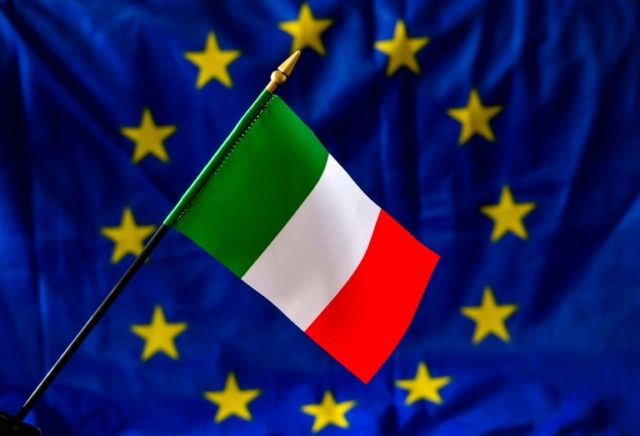Milan (AFP) – The European Union on Friday issued a stern warning to Italy’s populist leaders following their defiant pledge to increase spending and run a budget deficit that risks putting Rome on a collision course with Brussels.
Thursday’s deal on a 2.4 percent deficit for the next three years came after warnings from the European Commission — the EU’s executive arm — to hold the reins on spending.
It vastly exceeds the 0.8 percent forecast by the previous, centre-left government, and comes dangerously close to the EU rule saying that government deficits cannot exceed 3.0 percent of gross domestic product (GDP).
Crucially, it will inflate the country’s already mammoth debt burden — currently 131 percent of GDP, the biggest in the eurozone after Greece and way above the 60 percent EU ceiling.
In morning trade Friday the Milan stock exchange plunged, dropping by 2.5 percent, as jittery investors dumped shares while the yield on Italian government bonds shot up above the symbolic 3.0 percent threshold.
– ‘Accident waiting to happen’ –
“It is a budget which appears to be beyond the limits of our shared rules,” said Pierre Moscovici, who runs the European Commission’s economic and finance portfolio.
“If you allow public debt to increase you create a situation that becomes unstable as soon as the economic context worsens,” he added.
Italy does indeed face a lacklustre growth forecast: just 1.0 percent in 2019 according to the Bank of Italy and the International Monetary Fund (IMF), and 1.1 percent according to the European Commission.
The budget decision follows weeks of suspense over whether Western Europe’s first anti-establishment leadership would defy Brussels and uphold its costly electoral promises to increase public spending after years of austerity.
Italy’s joint deputy prime ministers Matteo Salvini and Luigi Di Miao welcomed the deal, secured at the last minute in a victory over the country’s more cautious finance minister, saying: “We’re satisfied, this is the budget of change.”
Finance Minister Giovanni Tria, an independent, had attempted to set an upper deficit limit of 1.6 percent but was forced to back down.
His capitulation came just hours after rumours he would be pushed out if he refused to play ball.
Analysts said that by keeping the deficit below the EU’s 3.0 percent limit, Italy may have eschewed triggering an all-out eurozone crisis — for now.
“As long as Italy does not breach the 3.0 percent limit, the EU will likely admonish Italy without imposing a fine that could trigger an anti-European backlash in Italy,” said Holger Schmieding, chief economist at Berenberg Bank.
“An Italian debt crisis remains an accident waiting to happen,” he added.
– ‘Historic day’ –
In a message on Facebook, Di Maio celebrated the deal Thursday, posting: “Today is a historic day! Today Italy changes! For the first time the state is on the people’s side. For the first time it is not taking away, but giving.”
He had previously threatened to vote against the budget unless funds were found for projects promised in March elections, including the movement’s flagship pledge for a basic monthly income of 780 euros for the unemployed and those on low wages.
There were 10 billion euros ($11.5 billion) earmarked for the income pledge in the budget, which “for the first time in the history of this country will eradicate poverty”, he said.
Salvini said the budget would lower taxes by 15 percent for over one million Italian workers and free up around 400,000 jobs for the young by enabling people to retire earlier.
All would be paid for without imposing a VAT hike on long-suffering Italians, he said.
Italy’s draft budget must be submitted to the European Commission by October 15, and “a protracted period of negotiation between Italy and the Commission seems likely,” said Jack Allen, senior economist at Capital Economics.
The big spending pledge unnerved investors as financial markets trading got under way, and drove up the spread between Italian bond yields and those of Germany, the low-risk benchmark in the eurozone.
The rate of return on 10-year Italian government bonds shot to 3.084 percent from 2.888 percent at the end of trading Thursday, while the spread with German bonds — the “risk premium” on Italian debt — widened to 2.6 percentage points.
The higher the yield, the more expensive it is for the state to borrow money, reducing its financial margins for manoeuvre.
The deal also hit the euro, which slipped to 1.1625 from 1.1641 against the dollar.
burs-ser/jh

COMMENTS
Please let us know if you're having issues with commenting.